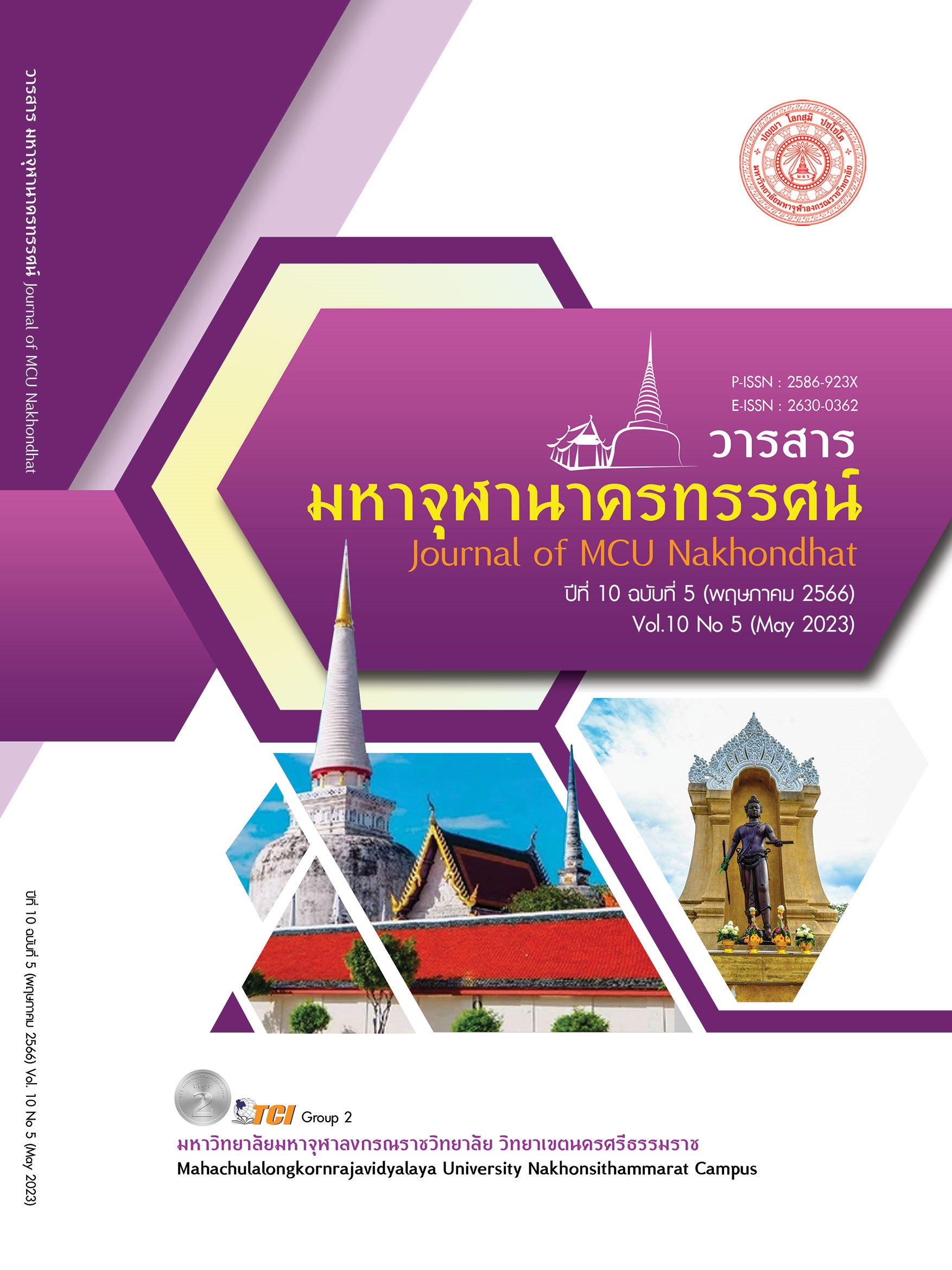THE NEW NORMAL OF MONKS NOVICE POST THE SPREAD OF COVID-19 IN PHUKET PROVINCE
Main Article Content
Abstract
This research has two objectives: 1) to study the new normal of monks and novices after the spread of COVID-19 in Phuket and 2) to study the new normal of monks and novices after the spread of COVID-19 in Phuket. The researcher uses a research model that is a mixed method research. Qualitative research Using in-depth interviews from 24 key informants, and A quantitative research by distributing a questionnaire a sample of 225 people. Descriptive statistics were used: frequency, percentage, mean and standard deviation. The results found that New normal for monks and novices after the situation spread of COVID-19 In Phuket, the all 5 parts has a high average level ( = 3.70). When considering each aspect in order of average from descending, it was found that they were at a high level in all aspects. They can be sorted as follows: Behavior in relation to society ( = 3.82) Behavior in daily activities ( = 3.77) Behavioral aspect of social leadership ( = 3.72), the religious behavior aspect ( = 3.63), and the education aspect ( = 3.55). The new normal of monks and novices after the situation spread of COVID-19 In Phuket, it was found that the behavior of monks and novices in the 4 aspects should behave as follows: 1) comply with the Ministry of Public Health's DMHTT measures, 2) use technology in communication and learning, 3) use technology in relationships. with society and 4) use technology to educate and to guide society. Suggestions: The abbot must establish clear guidelines for monks and novices. Phra pariyattidhamma School should provide equipment and technology to support online teaching and learning for educational personnel. And the temple should have a screening device for people who participate in temple activities to prevent COVID-19. according to the policy of the Ministry of Public Health or according to DMHTT measures
Article Details

This work is licensed under a Creative Commons Attribution-NonCommercial-NoDerivatives 4.0 International License.
References
กรมควบคุมโรค กระทรวงสาธารณสุข. (2564). แนวปฏิบัติในการป้องกันควบคุมโรคไวรัสโคโรนา 2019 สำหรับสถานที่ประกอบพิธีกรรมทางศาสนา (วัด โบสถ์ มัสยิด ศาลเจ้า). เรียกใช้เมื่อ 8 พฤศจิกายน 2564 จาก https://ddc.moph.go.th/viralpneumonia/file/measure/mea_religious_040363pdf
ทนงศักดิ์ แสงสว่างวัฒนะ และคณะ. (2563). New Normal วิถีชีวิตใหม่และการปรับตัวของคนไทยหลังโควิด-19: การงาน การเรียน และธุรกิจ. วารสารการบริหารการปกครองและนวัตกรรมท้องถิ่น, 4(3), 371-386.
ไทยรัฐออนไลน์. (2564). รายงานสถานการณ์โควิด-19. เรียกใช้เมื่อ 8 พฤศจิกายน 2564 จาก https://www.thairath.co.th/event_corona
บุญชม ศรีสะอาด. (2545). การวิจัยเบื้องต้น. (พิมพ์ครั้งที่ 7). กรุงเทพมหานคร: สุวีริยาสาส์น.
พชร สุขวิบูลย์. (2564). การสำรวจพฤติกรรมของคนที่เปลี่ยนแปลงไปในช่วง COVID-19. ใน วิทยานิพนธ์บริหารธุรกิจมหาบัณฑิต สาขาวิชาบริหารธุรกิจ . บัณฑิตวิทยาลัย มหาวิทยาลัยธรรมศาสตร์.
พระมหาจำนงค์ สิริวณฺโณ. (2564). แนวทางการจัดการบทบาทพระสงฆ์ในการปรับตัวกับสถานการณ์โควิด-19. Journal of Modern Learning Development, 6(1), 395-405.
พีรพัฒน์ ใจแก้วมา. (2563). การศึกษาพฤติกรรมการดำรงชีวิตแบบปรกติใหม่ของประชาชนชาวไทยระหว่างวิกฤตโควิด-19 ที่ปรากฏในสื่อออนไลน์. ใน วิทยานิพนธ์วิทยาศาสตรมหาบัณฑิต สาขาวิชาภูมิศาสตร์. บัณฑิตวิทยาลัย มหาวิทยาลัยนเรศวร.
สำนักงานพระพุทธศาสนาจังหวัดภูเก็ต. (2564). สถิติพระภิกษุ สามเณรจังหวัดภูเก็ต ปี 2564. เรียกใช้เมื่อ 9 พฤศจิกายน 2564 จาก https://pkt.onab.go.th/th/page/item/index/id/18
สำนักงานสาธารณสุขจังหวัดภูเก็ต. (2564). รายงานสถานการณ์โควิด-19. เรียกใช้เมื่อ 8 พฤศจิกายน 2564 จาก https://pkto.moph.go.th/home.html
Kris Piroj. (2017). Table Taro Yamane. Retrieved November 8, 2021, from https://greedisgoods.com/taro-yamane/


